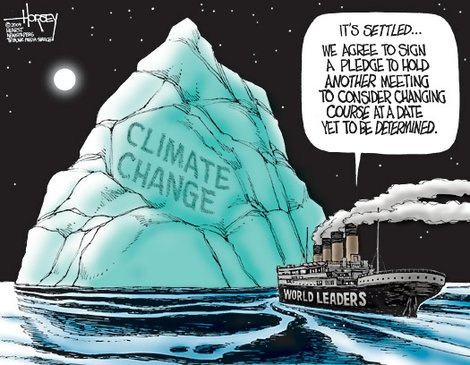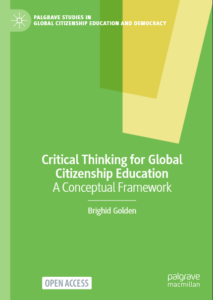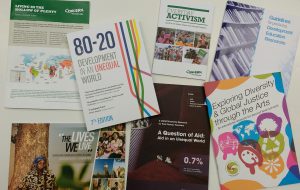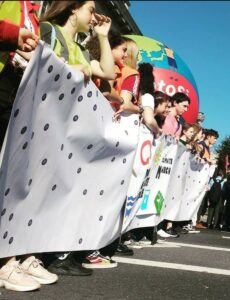Last week the 3 hour documentary Titanic: The Final Word with James Cameron aired on television, thanks to the National Geographic, boasting the latest data and computer graphics in reanimating the final moments of the famous vessel.
On the 100th anniversary of the fateful voyage of the most ambitious unsinkable ship of its time, Cameron amasses the brightest and deepest thinkers on Titanic all studiously focussed on gleaning the most comprehensive story of her demise on record.
Some have claimed that this update to Titanic’s story is nothing more than a jaunt in epic forensic wizardry. This is largely true – and utterly engrossing.
But where typical documentaries typically stop, Cameron keeps on going. In a wonderfully crafted metaphor, Cameron concludes the story by reflecting on it as a microcosm of all of the ills, ambitions, inequalities and arrogance’s that human societies manifest.
 Source: David Horsey for the Spokesman-Review
Source: David Horsey for the Spokesman-Review
While iceberg production is up by 60%, fewer and fewer are making it south from Greenland to the spot where Titanic sank due to the changes in temperature. This would have been good news in 1912, but not in a world where, as the Climate Change Team at the World Bank warn, we are now passing close to a long list of irreversible climate change tipping points, such as ocean acidity and coral die-off; drying the Amazon rainforest; run away growing fossil fuel use; loss of ice sheets; large scale melting of permafrost and “the biggest tipping point of all” – our inability to come anywhere near an agreement limiting global GHG emissions and warming. [For more see Dan Hoornweg’s blog post Be afraid. Be very afraid.]
James Cameron challenges the climate change sceptics, denialists and the conspiracy theory camp head on: are ‘tipping point’ collisions avoidable, or are we doomed to hit them due to our submerged arrogance?
Cameron’s final word on the Titanic:
Part of the Titanic parable is of arrogance, of hubris, of the sense that we’re too big to fail. Well, where have we heard that one before?
There was this big machine, this human system that was pushing forward with so much momentum that it couldn’t turn, it couldn’t stop in time to avert a disaster. And that’s what we have right now.
Within that human system on board that ship, if you want to make it a microcosm of the world, you have different classes: you’ve got first class, second class, third class. In our world right now you’ve got developed nations, undeveloped nations.
You’ve got the starving millions who are going to be the ones most affected by the next iceberg that we hit, which is going to be climate change. We can see that iceberg ahead of us right now, but we can’t turn.
We can’t turn because of the momentum of the system, the political momentum, the business momentum. There too many people making money out of the system, the way the system works right now and those people frankly have their hands on the levers of power and aren’t ready to let them go.
Until they do, we will not be able to turn to miss that iceberg and we’re going to hit it, and when we hit it, the rich are still going to be able to get their access to food, to arable land, to water and so on. It’s going to be poor, it’s going to be the steerage that are going to be impacted. It’s the same with Titanic.
I think that’s why this story will always fascinate people. Because it’s a perfect little encapsulation of the world, and all social spectra, but until our lives are really put at risk, the moment of truth, we don’t know what we would do. And that’s my final word.”
More on developmenteducation.ie

From Nicaragua to Ireland: Fairtrade Coffee and Global Solidarity
Fátima Ismael of Soppexcca, Cathal Murphy from Bewley’s and Fairtrade practitioner Kieran Durnien discuss 20 years of Fairtrade coffee solidarity linking Nicaragua and Ireland.

Critical Thinking for Global Citizenship Education
Join Brighid Golden for the launch of her latest book, ‘Critical Thinking for Global Citizenship Education: A Conceptual Framework’

Your voice matters – 2026 user survey open
It’s January, its 2026, and we want to hear what you’d like us to feature or work on in 2026.

Calling Post Primary Teachers – Survey Participation Request
Your voice is vital in shaping the future of education for sustainable development in Ireland. Join a national survey for post primary teachers in October, led by DCU researcher Valerie Lewis

Webinar: Science for development on World Food Day
The webinar will feature YSTE projects, from Santa Sabina Dominican College (Dublin), Moate Community School (Westmeath) and CBS Thurles that focussed on nutrition and better food production, with Self Help Africa’s nutrition and gender specialist in Ethiopia, Sara Demissew.

Student & teacher webinar: Food, hunger and SDG 2
Join the World Food Day webinar for post primary school students and teachers which will explore SDG 2: Zero Hunger.
